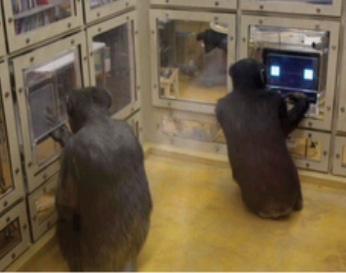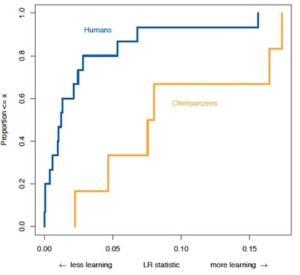“Troglodyte” is a term used to insult someone’s intelligence. It’s also the technical term for a chimpanzee – whose species name is Pan troglodytes – and sure enough they aren’t as smart as us in most ways. However, there are a few intellectual tasks in which chimps will outperform humans; the most famous being memorization. Whilst humans have trouble remembering more than 7 things, chimps can memorize much more almost instantly (check out the video below). Now scientists have found another example of a behavior in which chimps not only beat humans, but even give computers a run for their money.
Now you don’t have to worry about chimp dominance, they weren’t directly competing with computers (although you probably should be worried anyway). Rather they seemed to be really good at finding the optimal solution to a particular social problem, with their behavior almost perfectly matching the predictions of computer models. Humans tend to be quite good at these tasks as well, although sometimes we get distracted by pesky emotions. For example, the optimal solution to the ultimatum game (where someone has a pot of resources and divides it between themselves and someone else, who then decides whether or not to accept it) is to give and accept any offer above zero; but humans are influenced by such weaknesses as “fairness” and often offer the other person almost half of the resources!

Chimps playing the game
The chimps, however, beat us at a different game (which unlike the ultimatum game, doesn’t seem to have a fun title). The gist of this other, unnamed game is that two chimps press either a right or left button. If their picks are the same one chimp is rewarded, but if they differ the other chimp gets a prize. If the two individuals start trying to predict how the other will play and picking the optimal choice for themselves based on this information the results fall into a patten known as the “Nash equilibrium”. This is a “pattern of play in which choices optimally anticipate what others are likely to do” and has all sorts of computery things backing it up as the best option.
And as I hinted at in the opening paragraph, chimps came very, very close to following this optimal solution. For three different variants of the game, the rates of success for the mismatching chimps were 0.5, 0.73 and 0.79. Meanwhile the optimal rates predicted by the equilibrium were 0.5, 0.75 and 0.8. So close! Conversely, when they got two groups of humans to do play these games they were more than six times “worse” (as in further from the equilibrium) than the chimps.
So why were they so much better than us? The researchers offer two (not necessarily mutually exclusive) hypotheses. Remember how I told you about how great chimp memory is? Well one idea is that this allows them to better remember previous rounds of the game; allowing them to learn the best strategy. Sure enough, chimps do seen to learn the best solution whilst humans keep guessing kinda randomly. The second hypothesis is that humans now have so much of our cognitive hardware dedicated to social life, problem solving, tool making and so forth that we’ve lost some of our capability for memory; hence why chimps are better.

A cumulative frequency graph of the apparent learning beach species did
Whilst these two hypotheses sound plausible, they are just hypotheses and need a bit data to support them before we declare them the solution to the problem. However, one conclusive thing did come out of this experiment: game theory works! This is the branch of science that calculates things like the Nash equilibrium, and this study reveals that animals (and by extension, perhaps evolution) really do pick out strategies based on the principles of game theory. So it isn’t a waste of time after all!
Reference
Martin, C. F., Bhui, R., Bossaerts, P., Matsuzawa, T., & Camerer, C. (2014). Chimpanzee choice rates in competitive games match equilibrium game theory predictions. Scientific Reports, 4. Chicago

